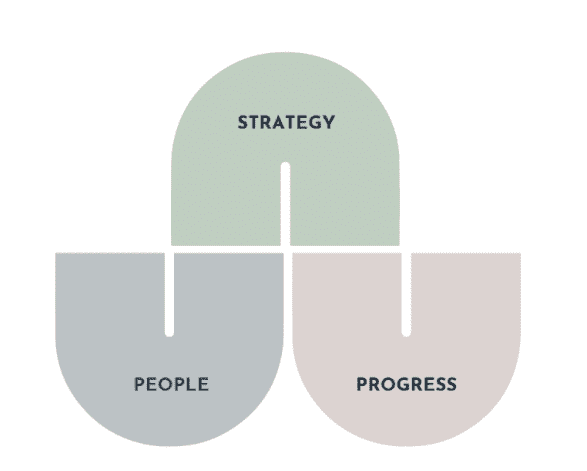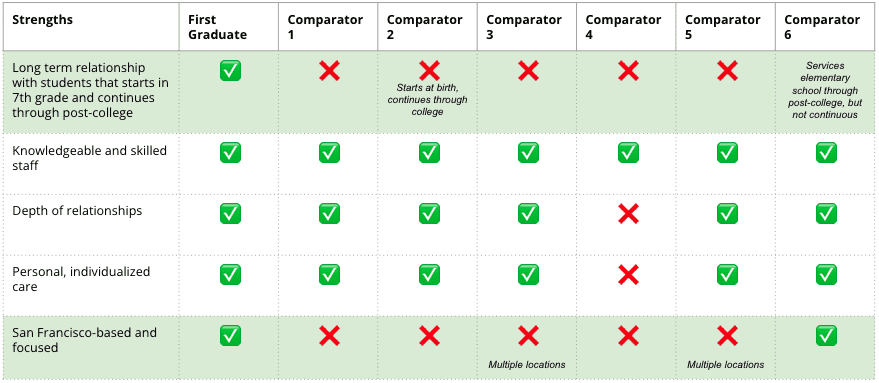Case Study

Find Out…
How First Graduate completed a three-year strategic plan that was equitable, inclusive and would guide their organization for the next several years of growth.

The Challenge
First Graduate is a San Francisco-based nonprofit on a mission to help students become the first in their families to graduate from college ready to pursue careers that are meaningful to them.
When they came to Prosper Strategies for support developing their strategic plan in early 2021, it was clear that First Graduate was already making a significant impact. The organization serves nearly 400 students in the San Francisco Unified School District, and 99% percent of their participating seniors enroll in college immediately after high school (the national average is 46%). Additionally, 75% graduate from college within six years.
Despite these successes, First Graduate knew they needed to continue to grow in order to progress toward their long-term vision of establishing a college-going tradition for every family in San Francisco, and did not yet have a clear plan for what that growth should look like over the next three years. They turned to Prosper for help exploring and prioritizing among their options, facilitating an equitable and inclusive strategic planning process, and setting clear, accountable objectives and key results that would guide their organization’s growth over the next three years.
We based our work with First Graduate on the Nonprofit Strategy System™, a complete set of tools and approaches that optimizes every aspect of nonprofit organizations for maximum mission impact.

People
We began our work together by exploring how to apply Prosper Strategies’ Shared Power Strategy™ to our work with First Graduate, to ensure their stakeholder priorities remained at the forefront throughout planning.
Because First Graduate is a youth-serving organization and students tend to be very busy, we focused on gathering young people’s inputs through surveys and interviews at the beginning of this process.
Then, we developed a primary planning committee made up of board and staff members who were intimately involved in plan development, and these individuals used student inputs to guide their decision making process.

Strategy
In the Strategy phase, we worked with the primary planning committee to conduct two assessments that would form a solid foundation for First Graduate’s strategic plan: an organization assessment and an ecosystem assessment.
In the organization assessment, Prosper Strategies and the committee together reviewed First Graduate’s past strategic plans, marketing and fundraising plans, financials, board and staff job descriptions, DEI priorities, program descriptions, organization charts and more. We also reviewed a variety of research First Graduate had already conducted to assess and evaluate its impact, such as an organizational capacity report produced by the Impact Capacity Assessment Tool by Algorhythm (iCAT).
In the ecosystem assessment, we reviewed a philanthropic scan First Graduate had conducted previously, as well as an assessment of the growth/scaling options chosen by other similar organizations. We also compared the strengths of First Graduate (as identified by its stakeholders in surveys) with the strengths of five comparator organizations that may compete for donations, share of voice or youth engagement. Grounding the committee in these assessments ensured everyone was on the same page as we moved forward with strategic planning.

This process uncovered several key insights that were important to address if the organization wanted to expand:
- First Graduate was facing significant challenges retaining both students and staff, and these challenges had only deepened as a result of the pandemic.
- Stakeholders felt that First Graduate needed to establish a solid foundation of college to career programming, parent/family programming, corporate and community partnerships, funding, and staffing.
- First Graduate is the only organization in its comparative set that has a continuous relationship with students from 7th grade through to post-college.
Based on these insights and the input from students and other stakeholders, we worked with the primary planning committee to develop a reason for being statement to clearly define First Graduate’s unique impact in comparison to others.
Then, we guided the committee through reaffirming First Graduate’s mission and vision statements, and went on to collaboratively develop a set of core values that would be critical to operationalizing the strategic plan we would build together.
With those foundational strategy elements in place, we moved onto a series of sessions designed to explore the strategic questions First Graduate would need to answer and the priorities they would need to pursue to support their mission over the next three years. This work resulted in the identification of three pillars around which First Graduate’s strategic plan was structured.
Throughout the Strategy phase of this work, First Graduate continued to revisit the People element of the Nonprofit Strategy System™ by asking students, community partners and others for feedback on things like their values and the pillars they were beginning to zero in on.

Progress
During the Progress phase of our work, we guided First Graduate through the process of defining 3-4 objectives and measurable key results (OKRs) for each pillar.
Then, we helped them lay out one year’s worth of activity plans, or specific actions that would need to be taken, under each pillar. We also worked with the planning committee to help them differentiate the role staff should play versus the role the board should play in executing the strategic plan, and went through several exercises to establish accountability systems, ultimately resulting in a definition of a clear “owner” for each pillar, objective, key result and activity.
Following our work together, First Graduate documented their strategic plan using the inputs from the sessions, as well as a strategic plan template we provided. While First Graduate had elected to write their plan themselves, Prosper Strategies served as a sounding board and editor throughout the process. In alignment with our Shared Power Strategy™ philosophy, we also encouraged the committee to seek additional input on the plan through listening sessions with students and other stakeholders.
After First Graduate’s strategic plan was drafted, we suggested a cadence of monthly, quarterly and annual meetings focused on carrying out the strategic plan, and built a dashboard they could use to track their objectives and key results. These tools and approaches would allow First Graduate to continually measure their progress on the pillars laid out in their strategic plan, and optimize according to what they were learning.
Results
First Graduate’s strategic plan has been adopted by the board and implementation began in early 2022.